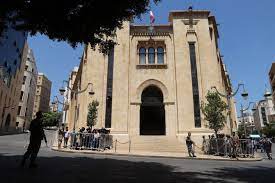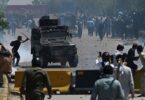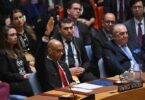Dr. Dania Koleilat Khatib
The Lebanese parliament last week extended the tenure of army commander Gen. Joseph Aoun, delaying his retirement for a year. With this decision, one can safely say that Lebanon dodged a bullet.
Aoun’s retirement, which was due in mid-January, would have been disastrous for Lebanon. The country has no president and no prime minister. Key positions in state institutions, such as the governorship of the central bank and the directorship of the General Security, are also vacant. Today, the only institution holding the country together is the Lebanese Armed Forces. It is the only institution that still has the respect of the international community. This is mainly due to the persona of the commander, who has been able to keep the army together and maintain a certain level of security against all odds.
The extension was suggested by Environment Minister Nasser Yassin, who is currently in charge of putting together an emergency plan. He pushed for the extension as an urgent step to prevent the breakdown of the country, as its southern front is in direct confrontation with Israel. Unfortunately, in Lebanon, everything is politicized and the different actors look for personal gain.
The extension was opposed by Free Patriotic Movement head Gebran Bassil, who did not want Aoun to stay in the game. By remaining in his position, Aoun will keep his eligibility for the presidency. Hence, Bassil tried to block the renewal and to pressure Hezbollah into toeing the line. However, this time the group did not abide by the whim of its Christian ally. The stakes were too high. With the various state institutions floating about with no guidance, no one could afford for the army commander’s post to be left vacant. Hezbollah knows that the disintegration of the army would mean internal unrest. At this moment, this is the last thing it wants. Because Lebanon could face an attack from Israel, domestic security and cohesion is of paramount importance.
Domestic cohesion is essential. Hezbollah did not directly confront its ally, the Free Patriotic Movement, as it did not vote for the extension. Instead, its parliamentarians left the assembly when the article was put to the floor. Hezbollah walks a fine line in terms of catering to its Christian ally’s demands. The group knows that it cannot afford additional popular discontent. People are blaming Hezbollah for the presidential void. It is being accused of holding the country hostage in order to serve Iran’s interests. If it had followed Bassil and blocked the extension of Aoun’s mandate, this would have cost them dearly and would have been skillfully used by their opponents. However, the significance of the extension goes beyond these issues – it is also a test of trust in Aoun. The general emerged from the parliamentary session as the strongest contender for any future presidential election.
The extension was a big loss for Bassil but a big win for Lebanon. It actually saved the country from disintegration. Given that Lebanon is bankrupt, the army’s expenditure, including salaries, were last year paid for entirely by Qatar. According to sources, the Qataris made it clear that they would not pay again unless they had a credible and trustworthy counterpart. They are right. Gulf states have for years endowed Lebanon with donations that have found their way into the pockets of corrupt politicians. Not anymore. Despite the fact that the political class hates Aoun, they do not want the country to collapse. They would not want to manage the mess that would result from the breakdown of the armed forces.
The international community also could not take the risk of seeing the leadership of the army left vacant. Everyone needs a credible interlocutor. And there is a consensus not to let Lebanon collapse. Does Europe want to see a wave of refugees leaving Lebanese shores? Does anyone want to see Lebanon become a launchpad for terrorist attacks? However, the extension of the commander’s remit will not really save the country; it will only prevent it from totally collapsing. But given the miserable situation the country is witnessing, the Lebanese have set the bar so low that even something as tactical as the one-year extension of the tenure of the commander of the army is seen as an achievement.
Despite the fact that the Americans want to keep the conflict in Gaza contained, nothing can guarantee that this will be the case. It is in the interest of the political class to have a credible leadership that the US can trust and for which Washington is willing to use its leverage to pressure Israel into restraining itself.
This is why the international community should capitalize on the “achievement” of last week’s session and push for the election of a president and a government. This might be the right moment to do so. It might be the moment to explain to the political class that, at this difficult time, no one is willing to talk to Lebanon unless it has a credible president, prime minister and government.







